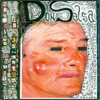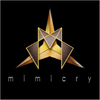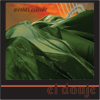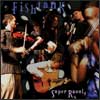EL DOUJE |
|
EL DOUJE was born Douglas Smolens in Guadalajara, Mexico in the early 1970s. From an early age, he was exposed to and sought out a diverse range of musical styles. In high school, he started playing drums in a band that would go on to become Don Salsa and record the legendary cult phenomenon, “Koolaid Moustache In Jonestown”. It wasn’t until after that album was finished that he really heard flamenco music for the first time, and his life would be changed forever. For whatever the reason, this particular form of artistic and emotional expression resounded so powerfully within him, he resolved to absorb this exotic music that seemed to cut deeper into his soul than anything previously felt. And so, at age 23, he started playing flamenco guitar. Having dabbled in guitar for a long time, this new, challenging music inspired the young artist to throw himself completely into it. Enraptured by the powerful rhythms, haunting harmonies, and heart wrenching vocals, he gradually absorbed the repertoire. Having come from California, worlds away from the flamenco homeland of Andalucia, it was only natural that el douje’s interpretation of this music would have a decidedly different feel. Early experiments in combining flamenco guitar with more modern electronic music elements such as drum and bass and techno proved quite successful and would lay the ground for what would later culminate in the album, ‘Worlds Collide’. Though the album was written, produced and performed by el douje as a solo artist, it contains impressive collaborations with artists such as Dave Weckl, bassist Tom Kennedy and members of the gypsy/metal fusion band Estradasphere. In early 2003, as the album was coming to a close, a chance meeting at the Oakland California performance warehouse, The Fishtank, would spawn the creation of gypsy/folk/klezmer/flamenco supergroup, The Fishtank. After only three weeks together as a band, they recorded their Mimicry Records debut, ‘Super Raoul’ live at the Fishtank. Led by gypsy fiddler extraordinaire Fabrice Martinez, the band combined the strengths of the individual members to forge unique and innovative approach to the folk music of the gypsies.
|
Selected Discography |
| ARTIST: Don Salsa ALBUM: Koolaid Moustache In Jonestown LABEL: [Independent Release] RELEASED: 1999 DURATION: 75:03 – 19 Tracks |
ARTIST: Various Artists ALBUM: Mimicry Sampler 2004 LABEL: Mimicry Records RELEASED: 2004 DURATION: 71:15 – 17 Tracks |
| ARTIST: El Douje ALBUM: Worlds Collide LABEL: [Independent Release] RELEASED: November 2004 DURATION: 75:27 – 13 Tracks |
 |
ARTIST: Foxycock ALBUM: Black Music For White People LABEL: [Independent Release] RELEASED: August 2005 DURATION: TBA |
| ARTIST: Fishtank ALBUM: Super Raoul LABEL: Mimicry Records RELEASED: November 2005 DURATION: 62:42 – 13 Tracks |
Exclusive Interview |
|
Justin St. Vincent from Xtreme Music received responses to an e-mail interview with El Douje (Douglas Smolens) on May 25, 2005. Xtreme Music: When did you begin learning Flamenco guitar and start performing under the pseudonym El Douje? El Douje: Shortly after completing the Don Salsa record “Koolaide Moustache In Jonestown”, I had what would turn out to be long separation from the other guys in the band. Up until that point, I had been a drummer for the last six years, always noodling on the guitar, and always closely watching our excellent guitarist Jason Schimmel. Soon after finishing the album, I was left bandless when Tim and Jason started playing with John Whooley and Dave Murray, and went on to form Estradasphere. So I didn’t quite know what to do with myself, but I knew I really loved playing guitar. At that time, I happened to check out, and not return, a 3 CD Flamenco compilation from the UCLA library, where I was going the school. Suffice it to say that this was the best thing I did while there. I had heard Flamenco before this and loved it, but the way I heard it now, I just knew instantly that my life was changed forever. It was a difficult decision at first to completely reroute my life’s direction, but ultimately I feel I didn’t really have a choice. This music grabbed me by the heart and pulled me into it’s world. So from then on, I played, practiced, and listened to as much Flamenco as I could. Gradually I absorbed the styles, techniques, and even emotions of the gypsies who made this music. More than a style of music, dance, or singing, Flamenco is more accurately, a way of feeling and experiencing life more than anything. The profound depth of the existential essence of life is reflected most passionately in Flamenco. Several years into the journey, in a moment of inspiration, I realized in an instant, that I was to be, El Douje. You can’t be a Flamenco guitartist with the name Doug, it just doesn’t work, and the Spanish can’t pronounce it anyway. It wasn’t until several years later that this revelation would bear its fruit in the album “Worlds Collide”. Xtreme Music: Please tell us about the writing processes involved in producing your debut album “Worlds Collide”. El Douje: Over the years of learning to play in the Flamenco style, I gradually accumulated lots of original falsetas. A falseta is just a short musical statement or phrase. Flamenco songs are made up of lots, maybe hundreds of individual falsetas. They’re each like a single piece of a puzzle. So basically the Flamenco guitarist practices these falsetas individually and maybe finds some that go well together. Now the thing that I really love about Flamenco is that songs are largely improvised by spontaneously combining falsetas based upon your particular feeling at the moment. Around this same time I got my first real computer and some music software, Reason to make beats. Let me tell you, its much more fun to practice to something with a groove than a click track. So I essentially used these programs that make techno music, as a glorified click track with a groove to practice to. Eventually, I put together some of my own techno beats and started to figure out that Flamenco and techno have some stuff in common rhythmically. With some small adjustments, I could combine them quite interestingly. It’s actually a pretty natural fusion I think. So the songs on the album are a combination of planned and spontaneous material. To me it’s important to leave that window of spontaneity open. It encourages you constantly keep reaching for something new and interesting. Xtreme Music: What innovative production techniques do you incorporate into your recorded music? El Douje: One of the things I’m very happy about with the album is the collaborations. I was able to get many acclaimed and inspiring musicians to lend me their talents on this record. For example, with Dave Weckl and Tom Kennedy, I would send them stereo mixes of my songs, let them learn and record it at their lesuire, then they would send the tracks back to me. I would simply import their tracks back in my sequence and be amazed. It is just such an easy way to work with people that don’t live near you. I also dabbled quite heavily in the land of synths and effects to achieve the desired result, making frequent use of my Triton keyboard to supply the rich bed of sounds. I also really enjoyed getting creative with experimental effects like the plug-ins from Ohm Force. They are really out there, and sometimes putting the acoustic guitar through those effects, that you would never normally use for guitar, can yield very interesting results. I like to work from what I call a reductionist framework. I record and experiment with lots of different ideas and directions. I then weed through that material for only the best parts and attempt to edit those parts together. It can be very time consuming but it produces a more unique and unusual combination of parts. Xtreme Music: For those who enjoy music from El Douje, what other bands or musicians can you recommend? El Douje: For Flamenco, you must listen to the works of Camaron De La Isla and Paco De Lucia. When they were young they completely changed the direction of the music. Up until then everyone still played the old songs that had been played for who knows how long. They wrote boatloads of new material and infused the music with an urgent sense of improvisation. They simply are the greatest. Other Flamenco artists to explore are: Vicente Amigo, Tomatito, Moraíto, Enrique Morente, Duquende, Sabicas, Ketama, Gerardo Nuñez, Paco Cepero, Terremoto De Jerez, and Niña De Las Pines. I could go on for a long time but that’s enough to get started. As for other music, I’m influenced by people and bands with something unique and original to say. In no particular order: Farmers Market, Django Reinhardt, Mr. Bungle, Taraf De Haidouks, Jimmy Rosenberg, Estradasphere, Nusrat Fateh Ali Khan, and Ivo Papasov. Xtreme Music: What are your reflections from working in the studio together with Shamisen master Kevin Kmetz? El Douje: My first reflection is that everyone should be as open minded and fun loving as the God Of Shamisen, Kevin Kmetz. He approaches music with a sense of enthusiasm and reckless virtuosity lacking in most experienced and jaded musicians. His mind is pure and untainted, like a child’s, so he is perhaps is the most instinctive and inspiring collaborator I have worked with. The basic day went something like this, “Hey Kev, want to come over and record some Shamisen on my record”, and he would say “Hell yes my Voodoo brother, let’s rock it”. I would play him the song once, hit record and he would indeed rock it. So we basically just had a lot of fun doing it, which is something it seems that people sometimes forget. Our collaboration has continued into the recent projects of Fishtank and Foxycock. Xtreme Music: What can you tell us about the cover artwork and additional photography included within this album. El Douje: The album artwork was done by Samantha Fisher, a good friend and excellent graphic artist. We coincidentally had a very similar idea for the cover. We wanted to combine the shape of a guitar with a women’s curves to create a sort of, archetypal image of “women as mountain and source of creative instinct”. The actual image on the cover itself is a bit of a mystery that I’ll leave up to the imagination. But suffice it to say that I am very pleased how it turned out and I can’t wait to see the poster version. Xtreme Music: Tell us about the music that you’re currently working on with Fishtank and Foxycock. El Douje: I am really excited about these two projects. With both of them, I’ve had more fun, and been more artistically satisfied than ever before. Fishtank came together very quickly. Our old friend from Santa Cruz, Aaron Seaman [Accordion player in Fishtank] called us one day saying we had to come to his warehouse in Oakland to check out this phenomenal violinist, Fabrice Martinez. He wasn’t kidding. That night, myself, Kevin, and my brother Tim sat mesmerized as Aaron, Fabrice, and Ursula Knudson [Vocals, Saw, and Violin in Fishtank] played the most beautiful rendition of Kurt Weill’s song “Youkali” I had ever heard. I knew instantly that I wanted to play music with these people. After jamming a little bit we happened to book a lone show, just for fun in Santa Cruz. As fate would have it, Trey Spruance [of Secret Chiefs 3 and Mr. Bungle] was there and saw the potential in the band. He made it possible to bring Fabrice back to the states to do a record. And the record we made was done live over three nights in Santa Cruz and Oakland. At the time of the recording we had only played together for about three weeks. But the chemistry between everybody is just amazing. I would swear that we’ve all been playing together for years. Fabrice, who traveled through Romania in a mule drawn caravan for seven years, brought many wonderful and seldom heard gypsy folk songs to the group. He is definitely our musical leader and that’s usually how gypsy music goes. You have a virtuosic and somewhat flamboyant violinist who leads the group. But what makes Fishtank so unique is the combination of instruments and personalities. Ursula plays the saw, violin and sings more beautifully than anyone I have heard. Aaron brings a sense a reckless, punk rock virtuosity to the accordion and well as three original songs. He can write songs that sound like perfect avant-garde gypsy folk classics. Kevin Kmetz, well he is the God Of Shamisen, and he can keep up with Fabrice on all those melodies. Tim Smolens, producer and bass player extraordinaire was kind enough to lend his immense talents and impeccable sense of feel. Adam Stacey [of Secret Chiefs 3 and Estradasphere] makes his debut on percussion and sounds like he’s been playing it all his life. I bring my specialty of Flamenco guitar to the band. Together, this combination of instruments and personalities has turned out to create a very unique and surprising interpretation of gypsy music. Foxycock is a whole different thing. It started with the chance reconnection with my college friend and band mate Josh Murphy. We played a lot of music and had a great time in college but then lost touch for almost ten years. When we finally reconnected, the inevitable outcome was Foxycock. This thing literally happened by itself. Most of the songs were written in ten minutes, start to finish in an unusual burst of inspiration and improvisation. Many songs on the record are in fact the original, rough demo of the song that just happened to turn out so good, that we had to use it on the record. To quote from our record release statement: “Foxycock (n) – Truly extreme pop/rock satire/political bossa nova, filtered through Unicorn influenced space rainbow jazz.” If you’ve ever wondered what it would sound like if an atomic bomb the size of a black hole exploded backwards inside the bowels of the universe… well get ready to find out with the smooth sounds of Foxycock. On their debut album, “Black Music For White People” released in summer 2005, Foxycock embark on a trans-galactic musical journey of comedic catharsis to bring the lost power chord back to earth, destroy the powers that be through peaceful means, and score some space weed. The music of Foxycock projects the listener through a one-hour sonic wormhole of infinite awkward possibilities into a universe on the brink of destruction. Both juvenal and sophisticated, inspiring and offending, the New York Times says: “Foxycock answers the ultimate question of life!” Taking on such timely and controversial subjects as trans-racial eroticism, 9/11 nostalgia, 80’s music obsession, internet porn addiction, gay children’s songs and reptilian/humanoid government leaders, Foxycock’s music, though not for the weak of heart, is sure to provoke, offend and/or entertain you. You really just have to hear it to understand it. If you have a sense of humor about music and life in general, and aren’t easily offended, I’d say you are sure to enjoy Foxycock. Xtreme Music: How have El Douje live performances been going and what has the crowd reaction been like? El Douje: Unfortunately, up till now my recording and work schedule has prevented me from performing live very often, but I am in the process of correcting that now. When I do get a chance to play live for people, the reaction is very visceral. Flamenco is something that hits you in the gut. It affects you on a level that is very primal and emotional, before the psyche has a chance to over analyze things. So I’m starting to play much more frequently in my hometown of Santa Cruz while beginning to play sporadic performances up and down the west coast. Xtreme Music: What are your plans for musical projects in the near future? El Douje: That’s a good question, there is a lot in the works. I’m actually beginning work on three albums simultaneously. First up is a bit of a departure. I’m producing a massive pop collaboration. I say “pop” loosely. It’s a collaboration of songs between Josh Murphy, Jeff Attridge, George Smith, Jason Schimmel, and myself. This record will be the summation of what it is that we want to say artistically in popular culture vein. It’s gonna be good. Also I’m beginning work on the next El Douje record. It’s still young in my mind so I’m not sure how it’s exactly gonna take shape but the vision is definitely swirling around ambiguously in my mind. Thirdly, I’m beginning work on some songs that will be seen on the next Fishtank and Don Salsa records. We have been talking for years about doing another Don Salsa record and I think that now the time is right. It will be an enormous undertaking as always, but eminently worthwhile. So, I look forward to bringing you much more Xtreme Music in the near future. |

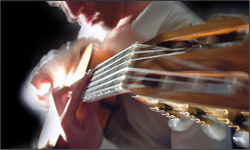
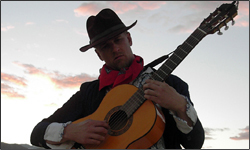
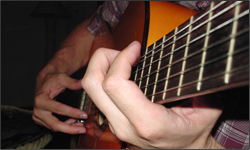 Bio & Photo Credit:
Bio & Photo Credit: 